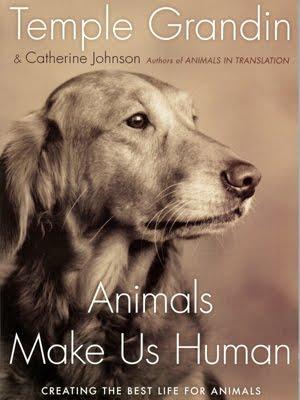Animals Make Us Human: Creating the Best Life for Animals

I used to work at a college with a woman who had Asperger syndrome. Because we were both far more interested in animals than humans, we would convene every morning to discuss what sorts of dogs we’d seen during our respective commutes. “I saw a large German Shepard out for a walk,” she would tell me with as much as emotion as she ever showed. In response, I would tell her stories about my cat. Without fail, she would ask about him every single day.
After spending a year of my life comparing notes with my co-worker, it was reassuring to come across the work of Dr. Temple Grandin. Grandin, a doctor of animal sciences who has a type of high-functioning autism, is widely regarded for her work to improve humane treatment of animals, including livestock. A visual thinker, she often compares her own cognitive abilities to those of animals. She has said, for example, that animals are highly sensitive to sensory detail in the same ways that she is. While not a radical animal rights advocate, Grandin is the best mainstream ally that a soft sciences vegan like myself can find. In Animals Make Us Human, she explores the ways in which humans can create the best existence for the animals in their lives.
Grandin believes that we are responsible for animals. In order to best provide for them, she lays out practical guidelines about healthy environments and debunks myths about animals’ “natural states.” She tackles a broad range of topics, from providing positive reinforcement to cats to distinguishing between captive and companion animals. She questions Dog Whisperer Cesar Millan’s alpha dog theories while admitting that his work has created a functional—if unnatural—environment for rescue dogs. Grandin’s unique blend of scientific writing and layperson language makes her writing uniquely interesting and accessible. In one paragraph, she will explain different types of dog aggression. In the next, she will chastise a human’s behavior and write, “What that lady did was terrible.”
Grandin and I fundamentally disagree on ideas like “humane slaughter,” since I don’t believe any slaughter is humane—let alone necessary. We also disagree about zoos. While she feels that zoo enrichment programs have made conditions better for animals in captivity, I can’t go near park gates for fear I’ll either start hysterically sobbing, trying to free the animals, or both—the former having already happened far too many times in my life.
Grandin also acknowledges in the book’s Afterword that she continues to work in the industry instead of protesting from the outside because, in her lifetime, conditions have radically changed. She continues to eat meat based on the conditions she saw at the beginning of her career in the 1970s. I find this a bit frustrating since thirty years later, factory farming has exploded in the Americas, and the treatment of farm animals has become shockingly bad in many places. It’s never too late to reevaluate.
I respect Grandin’s work because as much as I’d prefer that factory farms be outlawed tomorrow, I believe her advocacy does improve life for many animals. Unlike some scientists in her field, she firmly believes that animals have emotions that must be respected. My own personal convictions aside, Grandin’s books about animal-human relationships are one step forward for people who never before considered animal welfare from a practical standpoint.
I disagree Allen, but I'm glad you can see the value in zoos. I see from a profile online that you're familiar with the Indianapolis Zoo. Small world; I grew up about thirty minutes from there and my best friend lives right down the street from it now.
Instead of debating that zoos are not prisons—which is pretty futile since my definition of captivity tends to include a prison-like lack of freedom (though I did not call them "prisons" in my review) and you stand to profit from zoos' existence since you write about them—it should instead be noted that many endangered animals wouldn't be in such a condition without human's screwing things up. I suspect we can all agree on that one.
Grandin is right about zoos. If they did not exist, neither would many endangered animals. Without zoos, there would be no more American bisons (buffalo), Arabian oryxes, or many other species.
Zoos are NOT "animal prisons". In fact most of the modern American zoos are more like "animal resorts".
Allen Nyhuis, Coauthor: America's Best Zoos
I'm right there with you, Julie. For me, veganism is rooted in understanding how oppression of animals, racism, and sexism are all intertwined (not to mention environmentalism, fair labor practices, et al - also all feminist issues). I'm pretty sure Grandin wouldn't call herself a feminist, though of course I really have no idea. I think her message is generally a palatable one for folks who still see a difference between their pets and their dinner. I don't see her writing as revolutionary feminism, but I do hope by making people consider "better lives" for animals, she will help shift consciousness towards humane choices. And as I said, I don't believe slaughter - or taking babies from mothers, forcibly impregnating heifers to continue milk production, and the like - is ever humane.
One interesting thing about the animal "industry" that I haven't heard Temple address is the exploitation of female animals because of their ability to reproduce... babies, milk, eggs, etc. How can we call ourselves feminists and uphold an industry that exploits females so horribly?